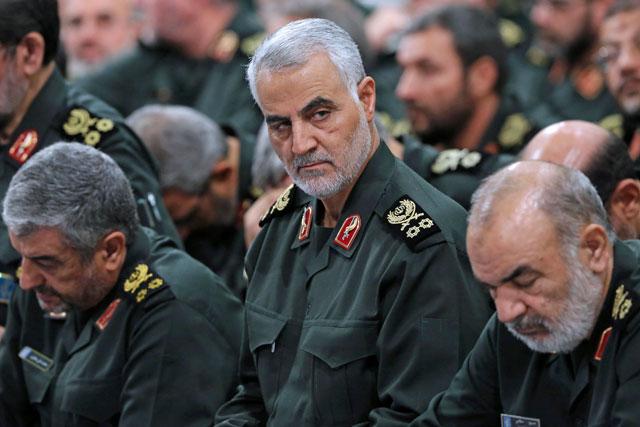You are here
General Qassem Soleimani — Iran’s regional pointman
By AFP - May 17,2018 - Last updated at May 17,2018

In this handout photo released on September 18, 2016, by the official website of the Centre for Preserving and Publishing the Works of Iran's supreme leader shows the Iranian Revolutionary Guards Quds Force commander Qassem Suleimani (centre) attending a meeting of Revolutionary Guards commanders in Tehran (AFP photo)
TEHRAN, Iran — By some counts the most popular figure in Iran, Revolutionary Guards commander Qassem Soleimani is also one of the most powerful in the region and seen as a deadly adversary by the US and its allies.
General Soleimani, who heads the external operations Quds Force for the Guards, was again showing his regional clout this week as AFP sources reported his direct involvement in top-level talks over the formation of the new Iraqi government.
It is no surprise for a man who has been at the centre of power-broking in the region for two decades.
Where once he kept to the shadows, Soleimani has lately become an unlikely celebrity in Iran — replete with a huge following on Instagram.
His profile rose suddenly when he was pushed forward as the public face of Iran's intervention in the Syrian conflict from 2013, appearing in battlefield photos, documentaries — and even being featured in a music video and animated film.
To his fans and enemies alike, the 61-year-old is the key architect of Iran's regional influence, leading the fight against militant forces and extending Iran's diplomatic heft in Iraq, Syria and beyond.
"To Middle Eastern Shiites, he is James Bond, Erwin Rommel and Lady Gaga rolled into one," wrote former CIA analyst Kenneth Pollack in a profile for Time's 100 most influential people last year.
"To the West, he is... responsible for exporting Iran's Islamic revolution, supporting terrorists, subverting pro-Western governments and waging Iran's foreign wars," Pollack added.
With Iran roiled by protests and economic problems at home, and the US once again mounting pressure from the outside, some Iranians have even called for Soleimani to enter domestic politics.
While he has dismissed rumours he might one day run for president, the general has played a decisive role in the politics of Iran's neighbour, Iraq.
Before this week's post-election manoeuvring, he was pivotal in pressuring Iraq's Kurds to abandon their plans for independence after an ill-judged referendum last September.
Decision maker
His influence has deep roots, since Soleimani was already leading the Quds Force when the US invaded Afghanistan in 2001.
"My Iranian interlocutors on Afghanistan made clear that while they kept the foreign ministry informed, ultimately it was General Soleimani that would make the decisions," former US ambassador to Iraq Ryan Crocker told the BBC in 2013.
His firm but quiet presence, and his somewhat hang-dog expression, play perfectly to the Iranian penchant for “dignified humility”.
"He sits over there on the other side of room, by himself, in a very quiet way. Doesn't speak, doesn't comment, just sits and listens. And so of course everyone is thinking only about him," a senior Iraqi official told The New Yorker for a long profile of Soleimani.
A survey published this year by IranPoll and the University of Maryland — one of the few considered reliable by analysts — found Soleimani had a favourability rating of 83 per cent, beating President Hassan Rouhani and Foreign Minister Mohammad Javad Zarif.
That is worrying to some Western leaders, who see him as central to Iran's ties with militia groups including Lebanon's Hizbollah and Palestinian Hamas.
British Foreign Secretary Boris Johnson said on Tuesday that US plans for regime change in Iran were misguided precisely because they might put Soleimani "in a very good position to take over from Ayatollah Khamenei".
To many in Iran, a military strongman could be an improvement on the faltering governance of recent years, particularly since he appears to supercede some of Iran's fraught social divides.
"If a military president becomes elected, he can surely solve people's problems," said a hardline member of parliament in March, immediately bringing Soleimani to everyone's mind.
Part of his appeal is the suggestion that he might bridge Iran's bitter social divides on issues such as its strict "hijab" clothing rules.
"If we constantly use terms such as 'bad hijab' and 'good hijab', reformist or conservative... then who is left?" Soleimani said in a speech to mark World Mosque Day last August.
"They are all people. Are all your children religious? Is everybody the same? No, but the father attracts all of them."
Related Articles
WASHINGTON — The United States on Thursday sanctioned Sohrab Soleimani, the brother of the commander of Iran's Revolutionary Guards, for his
TEHRAN — Iran's Revolutionary Guards announced Thursday the arrest of three "terrorists" accused of plotting an attack against senior comman
Qassem Soleimani's role in a political crisis in Iran highlights the influence of the leader of the Revolutionary Guard's Quds Force, who ha
















